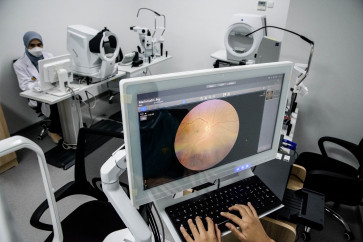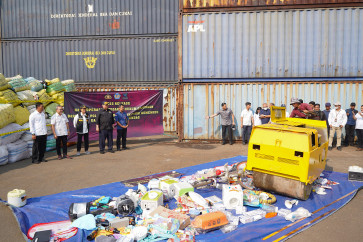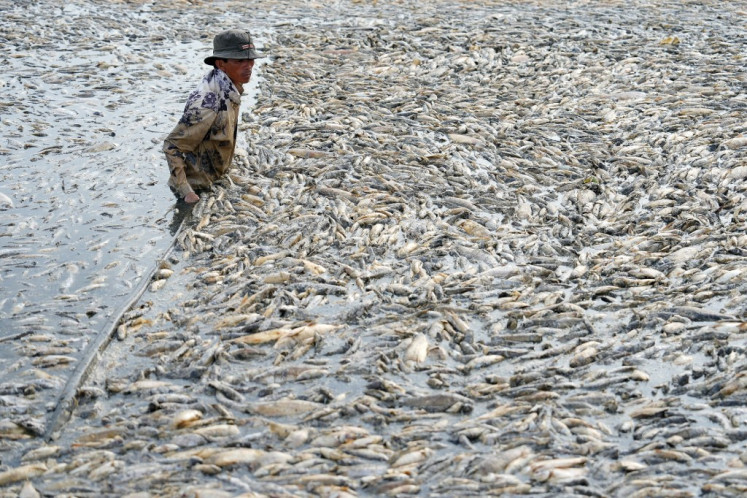Big data and the thorn of ethical implications
When an information and communications technology (ICT) company approached a big private organization in Indonesia to offer the use of an online learning application for the organization’s thousands of schools and connect them throughout the country, some of the board members of the organization expressed curiosity about where the company would store the immense data of the schools
Change Size

W
span>When an information and communications technology (ICT) company approached a big private organization in Indonesia to offer the use of an online learning application for the organization’s thousands of schools and connect them throughout the country, some of the board members of the organization expressed curiosity about where the company would store the immense data of the schools.
As the company said the data would be digitally stored in the cloud, the board members flatly rejected the idea, as they feared the data, which includes personal data of teachers, students and even parents, could be misused.
They said they would like the big data of their schools to be stored on a server located in the organization’s compound.
Also, during a recent workshop on big data in Jakarta, at least three people raised concerns of privacy and ethics related to the use of private data.
Indeed, having our data incongruously exposed could lead to unintended or even harmful consequences.
We know that criminals track our status on social media to determine when they would break into our house. We‘ve heard about Mark Zuckerberg being questioned by the United States Congress about accusations of Facebook giving a social engineering firm illicit access to the personal details of social media users.
We also heard about Cambridge Analytica being suspected of interfering in elections on a number of continents.
But big data improves the way governments run their day-to-day work, enabling them to meet certain needs more efficiently and precisely. For example, in Indonesia, the Defense Ministry, the Education and Culture Ministry, the Research, Technology and Higher Education Ministry and the Finance Ministry (particularly the Tax Office) have specifically developed and utilized big data as a foundation for good governance.
Big data, for example, provides the Education and Culture Ministry with almost real-time information about registered schools, including their teachers and students, across the country.
With the spirit of public accountability, governments tend to handle their big date with care, although there is always a risk of other parties misusing sensitive data.
Big data provides industries with the ability to analyze markets in near real-time to predict and generate more profits. For instance, Indonesian processed milk and butter producer PT Indolakto has undergone digital transformation by developing automatic process control and real-time android apps for the sales team. The initiative was aimed at multiplying profit.
With the growth of the Internet of Things, technologies like speed monitors in cars also provide valuable data for insurance companies as well as carmakers.
However, such things can also go too far. A store in Guatemala, for example, can track those who signed up for its app when they turn up in a rival store in the same mall without the consumer’s knowledge.
Hence, the increased use of big data has been criticized as potentially discriminatory, while creating distorted power relations between data owners and users. Some have begun to realize the risk of data exposure, but the explosive, frantic use of social media seems to distract many people from this peril.
Big data is somehow still regarded as ethically neutral, or providing benefits that outweigh the unintended impacts.
Referring to the first issue raised in this article, one executive of the ICT company suggested that primary and sensitive data of the schools could be stored on a special server in a compound belonging to the organization, while the secondary data could be stored on the ICT company’s servers or the cloud.
Be that as it may, it is inadequate.
A determined effort is needed to thoroughly protect personal and private information collected in very large datasets. Several countries have moved forward to enact special laws with severe legal consequences.
The European Union, for example, voted in favor of enacting the General Data Protection Regulation in 2016, which provides guidelines for the 28 member nations. Facebook has already found itself in the hot seat over legal compliance.
Malaysia enacted the Personal Data Protection Act in 2010. In Singapore, personal data is protected under the Personal Data Protection Act 2012. The Philippines enacted the Data Privacy Act of 2012 and Thailand’s Personal Data Protection Act was just endorsed this year.
What about Indonesia?
The collection of personal data is merely regulated by Communications and Information Ministerial Regulation No. 20/2016, which is regarded insufficient to deal with the growing use of digital personal data both in the government and private sector.
The ministry has submitted a more comprehensive bill to the House of Representatives, but deliberation on the draft was postponed due to the presidential and legislative elections in April this year. Once everything is settled and new lawmakers inaugurated, the House must prioritize the deliberation of the bill, as it is a constitutional mandate to safeguard citizens’ fundamental rights.
Aside from legal protection, people also need to be aware of the need to take action themselves to protect their personal data. Educating people on this issue is the task of all stakeholders, including the government and private sector, in particular ICT companies. If not, once the personal data is stolen or misused, people and society at large might have to suffer not only a loss, but also unbearable consequences.
______________________
The writer is the director of the Southeast Asian Ministers of Education Organization Regional Open Learning Center.









